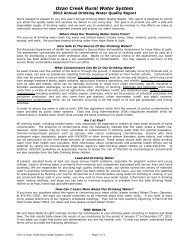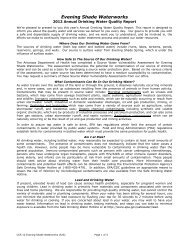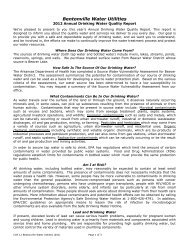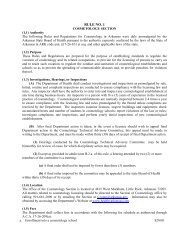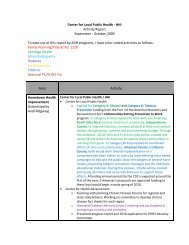Guidelines for Pool and Spa Operators - Arkansas Department of
Guidelines for Pool and Spa Operators - Arkansas Department of
Guidelines for Pool and Spa Operators - Arkansas Department of
You also want an ePaper? Increase the reach of your titles
YUMPU automatically turns print PDFs into web optimized ePapers that Google loves.
Principal Types <strong>of</strong> <strong>Pool</strong> Finishes<br />
Rubber-based paint is the most popular, <strong>and</strong> the best swimming pool paint type. A high quality chlorinated<br />
rubber base paint provides a smooth surface that repels water <strong>and</strong> is easy to clean. It‘s one <strong>of</strong> the easiest finishes to<br />
apply. The new coat partially penetrates the old to provide a perfect bond.<br />
Another type <strong>of</strong> rubber base paint is one which is based on synthetic rubber. Note: the synthetic rubber base<br />
covered here is not an emulsion paint, which is described in the next section.<br />
Emulsion or latex paint signifies a paint which uses water rather than a volatile solvent. This is a specialty<br />
item which is recommended <strong>for</strong> unpainted masonry pools which are moist at the time <strong>of</strong> application or <strong>for</strong> painting a<br />
pool previously coated with an emulsion.<br />
Vinyl paints <strong>of</strong>fer a smooth <strong>and</strong> satisfactory surface when applied by experts. Vinyl‘s volatile nature <strong>and</strong><br />
rapid set-up time dem<strong>and</strong> a special application technique. They‘re thin, require more coats, <strong>and</strong> increase labor costs.<br />
However, they are easy to clean <strong>and</strong> repaint.<br />
Epoxy paints can do an excellent job if they‘re two component epoxies (not ready mixed esters) <strong>and</strong><br />
carefully applied. Inferior products or improper application can cause chalking <strong>and</strong> delamination (pulling away <strong>of</strong><br />
one coat from another). On repainting, surface preparation requires extra care.<br />
―Cement type‖ finishes. Water-mixed cement paints are generally not desirable due to fading <strong>and</strong> powdering<br />
that require repainting each year. Keep in mind, though, that the old water mixed cement paint underneath will<br />
probably continue to loosen <strong>and</strong> fall away in patches. So prepare <strong>for</strong> some touch-up work each season.<br />
Preparing to Paint Your <strong>Pool</strong><br />
Concrete pools. Your pool must be washed be<strong>for</strong>e painting. First remove loose <strong>and</strong> peeling paint with a<br />
wire brush. Then wash your pool with any popular detergent to remove paint particles, dirt, scum, oil <strong>and</strong> grease.<br />
After washing, flush <strong>of</strong>f the walls <strong>and</strong> floor with clean water from a hose under pressure. Scrub continuously. Let<br />
the pool dry thoroughly be<strong>for</strong>e painting.<br />
Etching repaired areas: if your pool requires patching be<strong>for</strong>e painting, such cement patches must be etched<br />
to enable the paint to bond. Etching bare concrete prevents peeling <strong>of</strong> paint. Etching with muriatic acid opens up<br />
the microscopic pores <strong>of</strong> the concrete. The pool can be etched while still wet from cleaning <strong>and</strong> rinsing. Etching<br />
enables the paint to lock into the surface <strong>for</strong> proper bonding.<br />
All bare concrete pools require etching or s<strong>and</strong>blasting. If the surface <strong>of</strong> the pool has been steel-troweled,<br />
give special attention to good etching. A steel-troweled finish is not recommended: a wood-float finish should be<br />
used. If you have a gunite pool, or one which has a steel-trowel finish, or one whose surface is smooth <strong>and</strong>/or dense,<br />
a 20% or even 30% muriatic solution should be used.<br />
Refer to the next section (page 26) on how to acid etch a pool.<br />
24




